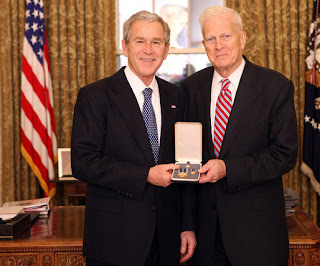Library of Congress Blocks WikiLeaks Site Access
By David Rapp Dec 8, 2010
The Library of Congress (LC) has been blocking access to the WikiLeaks website since December 3, on its wireless network available for visitors as well as on its own staff's computers, according to a report on the Talking Points Memo (TPM) Muckraker website. It's the first time that the LC has blocked WikiLeaks, and it comes on the heels of an Office of Management and Budget (OMB) memo advising federal agencies on policies regarding classified information.
OMB memo
On November 28, WikiLeaks began releasing the text of communications between the U.S. State Department and several of its diplomatic missions worldwide, many of which have been deemed classified. The leaked cables have since been made widely available online, and have received press coverage from major news sources, including the New York Times and the UK's Guardian.
On December 3, LC released the following statement, which it published on its blog:
"The Library decided to block Wikileaks because applicable law obligates federal agencies to protect classified information. Unauthorized disclosures of classified documents do not alter the documents' classified status or automatically result in declassification of the documents."
The blog post added: "The White House's Office of Management and Budget today provided the guidance that '[f]ederal agencies collectively, and each federal employee and contractor individually, are obligated to protect classified information pursuant to all applicable laws, as well as to protect the integrity of government information technology systems.'"
The OMB had sent out a memo the same day (obtained by TPM Muckraker) requesting that all federal agencies remind their employees and contractors "of their obligations to safeguard classified information," and supplied agencies with a "model notice" to use.
The OMB memo does not call for agencies to block access to any websites, but the notice does state that federal employees and contractors may not access classified material on non-classified government systems, "including classified documents available on WikiLeaks and other websites."
This requirement does not apply to "publicly available news reports (and other non-classified material) that may in turn discuss classified material, as distinguished from access to the underlying documents that themselves are marked classified." LC is not, for example, blocking access to newspapers that have reported on the leaks.
The OMB, which is part of the executive branch, has no direct authority over the Library of Congress—which, as its name implies, is under the jurisdiction of the legislative branch. But like all government agencies, the LC is subject to federal laws regarding classified information.
Librarians react
The LC action quickly sparked criticism in the library world.
On December 4, the Progressive Librarian Guild (PLG) posted a statement on its website urging the American Library Association to issue a formal condemnation of the LC's actions. It reads, in part: "We call on the American Library Association (ALA) to condemn unequivocally this move by the Library of Congress to actively conspire in preventing access to information in the public interest. Blocking access to this published information is censorship, plain and simple, and supporting sanctions against reading is endorsing abridgment of intellectual freedom."
Sarah Houghton-Jan, the Digital Futures manager at the San José Public Library (and a 2009 LJ Mover & Shaker), supported the PLG's call while expressing her own outrage on her Librarian in Black blog on December 6. She wrote, in part: "Blocking access to information, any information, is censorship. This action is unconscionable. I condemn the Library of Congress action in every way, and like others I fully reject their attempt at justifications or defenses of their action. There is never a justification for blocking access to information in a library—never."
Librarian Jessamyn West, on her Librarian.net blog, wrote on December 3 that she was "not totally comfortable" with the LC's action, and added: "The situation is, of course, quite complicated but I find this to be an odd precedent that makes me a little itchy."
A library-related WikiLeaks discussion also appeared December 7 on a forum on the popular social news site Reddit, where user "mardish" posted: "So I've got this idea to print out the Wikileak Cables and put them in a binder and donate it to my local library. Think this could become a movement?" He added: "If it's in a library, and the federal government tries to take down Wikileaks, they'll have to take down the libraries as well, but I firmly believe that if any organization would be willing to support this cause, it'd be the librarians."
No librarians, who are likely wary of the legal and logistical issues involved, have identified themselves and weighed in on the Reddit discussion yet—although more than one commenter pointed out that a paper copy of the cables' 250,000-plus documents would be enormous.
WikiLeaks and academia
In other WikiLeaks news, several sources, including the Huffington Post and the New York Times blog, the Lede, reported last week that Columbia University's School of International and Public Affairs (SIPA) had sent an email on November 30 to its students warning them not to post comments online about the WikiLeaks documents on Facebook or Twitter—as it might compromise their chances for working for the federal government in the future.
According to the email, SIPA's Office of Career Services received a call from an unidentified SIPA alumnus now working at the State Department, who recommended that students don't post links to or make comments about WikiLeaks documents, as "[e]ngaging in these activities would call into question your ability to deal with confidential information, which is part of most positions in the federal government." The email seemed to imply that such activities could turn up in a background investigation when students applied for federal jobs.
On December 6, according to a report on Wired's Threat Level blog, SIPA Dean John Coatsworth sent out an email in an apparent reversal of SIPA's position. It read, in part:
"Freedom of information and expression is a core value of our institution. Thus, SIPA's position is that students have a right to discuss and debate any information in the public arena that they deem relevant to their studies or to their roles as global citizens, and to do so without fear of adverse consequences. The WikiLeaks documents are accessible to SIPA students (and everyone else) from a wide variety of respected sources, as are multiple means of discussion and debate both in and outside of the classroom."
According to a blog post by James Fallows at The Atlantic website, an assistant dean at the Boston University School of Law sent out a similar email to students on December 1.


Comments
Dylan, NY